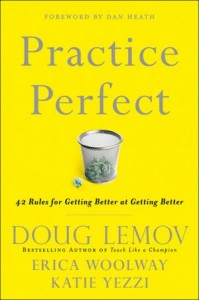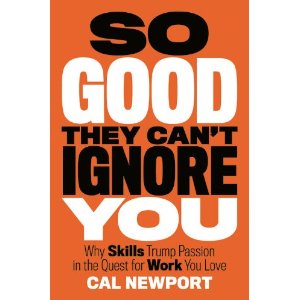I’m going to start this post with a commonly accepted premise: to achieve mastery of a specific skill requires 10,000 hours of deliberate practice. That’s the idea first propounded by expertise expert Anders Ericsson and popularized by Gladwell, Colvin and others.
There are actually a lot of things wrong with taking that statement too literally, but the general idea is not controversial: you have to put in a lot of time, and do a lot of the right things, if you want to reach the top levels of performance.
The problem is that if you want to be a great speaker or presenter, you will probably never have an opportunity in your entire lifetime to accumulate that much time practicing the craft, unless presenting and speaking to groups is practically all you do for a living. Just looking at the math, if you want to put in 10,000 hours in the first twenty years of your career, you’d have to present at least two hours every working day—and doing the same presentation over and over doesn’t count.
Fortunately, the second part of the premise—deliberate practice—is much more important, and it IS something you can control: quality is much more important than time.
 Having trained salespeople for twenty years, I’d like to think I know a thing or two about effective training. But having read Practice Perfect: 42 Rules for Getting Better at Getting Better
Having trained salespeople for twenty years, I’d like to think I know a thing or two about effective training. But having read Practice Perfect: 42 Rules for Getting Better at Getting Better, by Doug Lemov, Erica Woolway and Katie Yezzi, I also realize that I can further help my students and my clients by taking some of my training sessions up to a whole new level.
By now it’s well-known that the most important factor in mastery of a skill is thousands of hours of practice. Taking this idea one step further, what you need to consistently get better is deliberate practice, which is about repeatedly identifying specific areas that need improvement, practicing to get to a certain standard, getting immediate feedback and then practicing again until you get it right. This book takes the idea of deliberate practice one step further, by showing specifically how to isolate the key areas that need improvement, how to practice, and how to give and receive feedback. It’s organized into 42 rules for “getting better at getting better”.
The key theme of the book is that practice does not make perfect—it makes permanent. If you practice the right things wrong, or the wrong things right, you will permanently encode substandard performance. In other words, practicing the same thing over and over in the wrong way will only make you better at doing it wrong. Or, if you practice the wrong skill, you will get very good at something that will not contribute to your success. So, you first have to figure out what to practice by analyzing the domain you want to succeed in and then identify and prioritize the key skills that will have the greatest impact. Then, devise the proper drills to practice to a measurable standard so that you can encode success.
I judge if a book is worth reading by how many useful and immediately practical ideas I take from it, and Practice Perfect has given me at least a dozen. In a general sense, I plan to incorporate less scrimmaging and more drilling into the skills portions of my training sessions. For example, sales training teaches a variety of skills and then usually culminates in a realistic role play or presentation, after which participants are critiqued and then sent on their way. The problem with realistic training is that each new skill may only be practiced once, if at all. Drilling is intended to be unrealistic, so that it can provide multiple concentrated opportunities to practice each skill. As the authors say, use scrimmaging to assess, and drilling to improve.
While this may sound like common sense, it can actually be hard to sell to potential clients. In a tough economy everyone is justifiably tight with their training dollars and time spent away from the field, so they try to cram as much into shorter training sessions as they possibly can. The question that must be answered by sales executives or training professionals is: is it better to learn a lot of things imperfectly, or a few critical things perfectly?
One way out of that conundrum, as the authors note, is to plan training sessions meticulously, in order to get as much possible effectiveness out of every single minute. They note that in the NFL it has now become common to have “pre-game” meetings to prepare for practices, and that review of practice tapes is as important as game tapes. This idea is actually amazingly easy to follow even for full-time professionals who don’t have the luxury of much dedicated practice time. Almost everyone carries a tablet device or smartphone that takes video, and imagine how your skill level could improve if you would rehearse a sales presentation or questioning sequence before an important sales call.
Another way out of the conundrum is to provide a proper framework and standard for the most important skills and then help managers institutionalize the practice of practice within their organizations. In today’s fiercely competitive war for talent, it may be better to have a strong culture of practice and then hire for coachability and willingness to learn, as opposed to demonstrated skill.
The authors are education experts and have developed their techniques and rules for training classroom teachers, but they also weave in plenty of examples from sports[1] and business, and make it very clear that the ideas and techniques are universal to the proper learning of a skill. The first half of the book is devoted to individual skill improvement, and the second half offers practical advice for institutionalizing perfect practice within the organization.
Whether you are an executive seeking ways to improve the performance of your employees, Little League coach on the weekends, or a motivated self-learner, Practice Perfect is the book for you.
[1] In fact, it appears that the legendary basketball coach John Wooden is their patron saint, and you could certainly do worse than that in a book about practice.
 I’ve been following Cal Newport’s ideas for a while now, so when I learned that he was coming out with a book, I pre-ordered it from Amazon. I was not disappointed. If you have a child or know someone in college who is trying to figure out what to do with their life, or even if you’re north of fifty and still wonder what you’ll be when you grow up, then this book is for you. So Good They Can’t Ignore You: Why Skills Trump Passion in the Quest for Work You Love
I’ve been following Cal Newport’s ideas for a while now, so when I learned that he was coming out with a book, I pre-ordered it from Amazon. I was not disappointed. If you have a child or know someone in college who is trying to figure out what to do with their life, or even if you’re north of fifty and still wonder what you’ll be when you grow up, then this book is for you. So Good They Can’t Ignore You: Why Skills Trump Passion in the Quest for Work You Love, is so good that you shouldn’t ignore it.
The central premise that sets this book apart from so much life advice that is out on the market is that following your passion is terrible advice. There are two main reasons for this: first, very few people at a young age know enough about life to choose something to be really passionate about, and even if they do, they are bound to be wrong. If Steve Jobs had followed his early passion, maybe he would have made a dent in the universe as a Buddhist monk.
Second, while most people would love to have a job that allows them to be creative, make an impact on the world, and have control over how they choose to spend their time, jobs like that are rare and valuable, and the only way to get something valuable is to offer something in return. And the only way to be in a position to do that is to master a difficult skill. Passion doesn’t waive the laws of economics, and if it’s not difficult it won’t be rare. The book cites the example of Julia, who quit a secure job in advertising to pursue her passion of teaching yoga. Armed with a 4-week course, she quit her job, began teaching, and one year later was on food stamps. Here’s a hint: if a four-week course is enough to allow you to set up shop, do you think you might have a little competition?
Taking the economic model a step further, the book argues that you must develop career capital, which comprises skills, relationships and a body of work. The long and arduous process of building your capital also opens up your options and refines your own understanding of what you really like to do and what you can be good at.
Newport offers the craftsman mindset in place of the passion mindset. The passion mindset asks what the world can offer you in terms of fulfillment and fun; the craftsman mindset forces you to look inside and ask what you can offer the world. You have to create value to get value, and that takes time and deliberate practice. It’s the only way to get so good that they can’t ignore you. The nice benefit is that rather than being good at something because you love it, you love doing something because you’ve gotten good at it. (Note the similarity to Carol Dweck’s growth mindset.)
What’s the little idea? Another idea that Newport challenges is the common advice that you should have a big idea—set a big hairy audacious goal for your life and then work backward from it. The master plan approach certainly works for some people, but how many people do you know who have actually lived their lives that way? Instead, you should work forward from where you are, taking small steps that expand your capabilities and build up your career capital. In this way, more options and possibilities open up. Newport compares career discoveries to scientific discoveries, most of which occur in what’s called the “adjacent possible”, or just on the other side of the cutting edge of current knowledge. Although I never thought of it that way, that’s exactly how my training and consulting career has progressed. Any time I’ve developed new material it’s because a client has asked me to develop something for them that is just outside my current knowledge or skill set.[1] It’s close enough that they and I have the confidence that it can be done, but different enough that it leads to new material. In this way, I keep learning more and more and develop more career capital that in turn makes me even more valuable to the market.
The book is well-written. Newport emulates Malcolm Gladwell’s technique of telling individual stories to illustrate the main point in each chapter. In addition, the arc of the stories follows a master story thread through the book, so that you feel like you are brought along on his quest to figure it all out.
Here comes the part I did not like about the book, and I would not devote so much space to it if the author were not an MIT PhD, just beginning his career as an assistant professor of computer science.
The methodology in the book is suspect in two ways. While its stories are the book’s great strength, the plural of anecdote is not data, and it’s surprising how little hard data we’re given. I certainly buy in because it makes sense and it matches my own life experience, but someone with a more skeptical point of view may be a tougher sell.
Here’s an example. Between the ages of ten and twenty, I had an absolute passion to be a fighter pilot that I followed with a laser focus, so much so that I only filled out two college applications, to the Naval Academy and the Air Force Academy. When my straight shot to my goals was sidelined by a vision problem in my sophomore year at the Academy, my passion was up in smoke and I haven’t found anything since to quite match it. So, my own experience supports Newport’s hypothesis. But then I think of my friend Dirk, who followed the same path—except that he stayed on it and recently retired after a long and distinguished career doing exactly what he wanted to do.
In at least one case, where he does use a peer-reviewed study for support, he overstates the case. Citing a paper by Amy Wrzesniewski, he states that the happiest, most passionate employees are not those who followed their passion into a position, but those who stayed around long enough to be good at what they do. If you read the actual paper, you won’t find that conclusion, and in fact the author stresses that the sample size of 24 is too small to draw any firm conclusions.
That said, I strongly recommend this book to just about anyone, regardless of where you are in your career.
Related articles:
Bad Advice from the Passionistas



